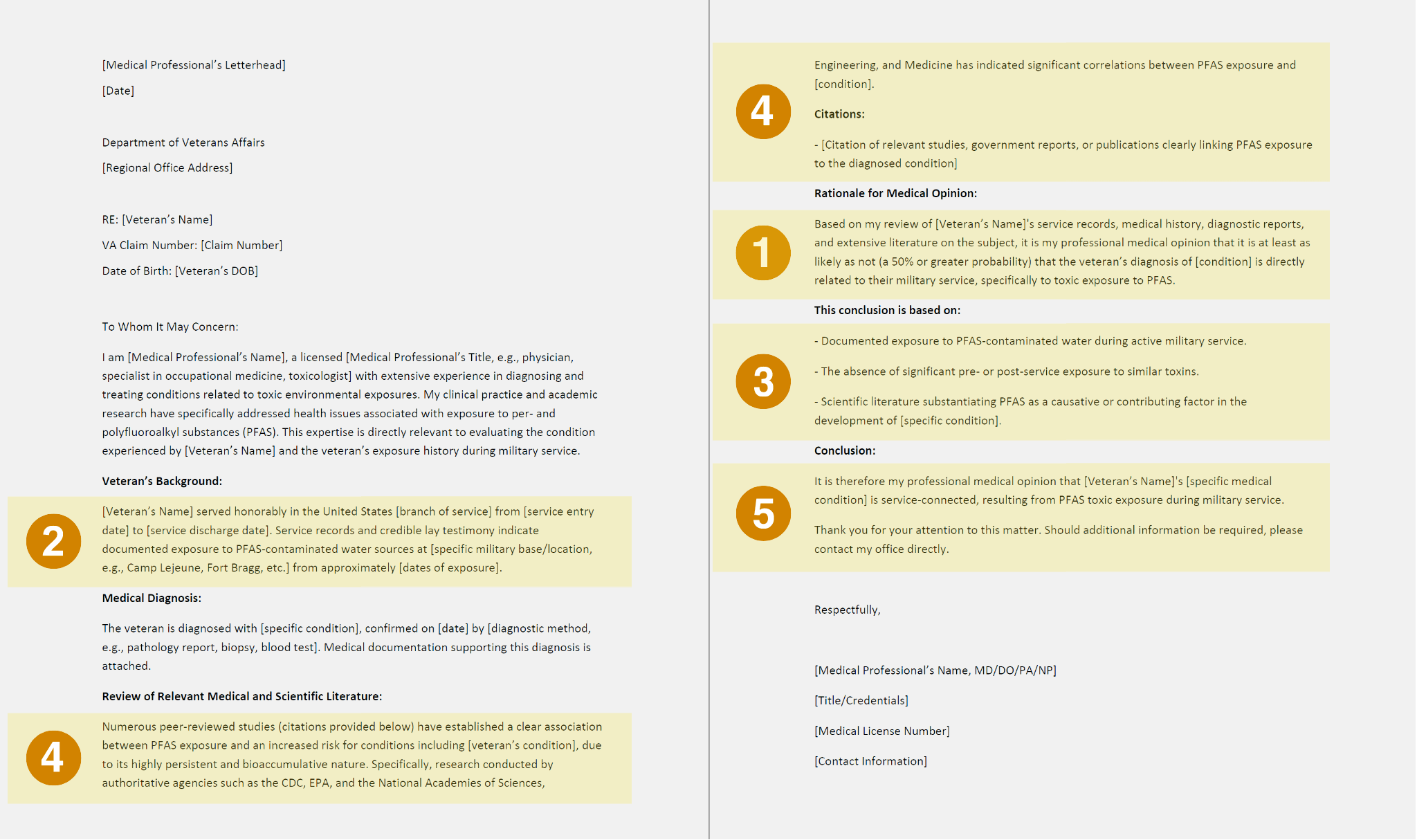Introduction
For veterans exposed to toxic substances during military service—whether it be PFAS, burn pits, Agent Orange, or radiation—proving a direct link between service and later-developing illnesses is often the most difficult hurdle in obtaining VA disability benefits. At the center of many successful claims is a key piece of evidence: the nexus letter.
This article explains what a nexus letter is and why it’s crucial for toxic exposure cases (especially those involving PFAS).
What is a Nexus Letter?
A nexus letter is a medical opinion written by a qualified healthcare provider that explicitly connects a veteran’s current diagnosed condition to their military service. The letter must be:
- Clear and persuasive
- Supported by medical rationale and scientific evidence
- Based on a review of the veteran’s service records, exposure history, and medical history
Without a strong nexus letter, many toxic exposure claims are denied—even if the exposure itself is documented.
Why a Nexus Letter is Critical for Toxic Exposure Cases
Toxic exposure claims are often harder to win because:
- Many toxic-related illnesses, like cancer or autoimmune disorders, take years or decades to develop.
- The VA typically requires proof of both in-service exposure and medical causation.
- Few conditions related to toxic exposure are not yet classified as presumptive unless tied to specific legislation (e.g., PACT Act).
Thus, a nexus letter becomes the bridge between the veteran’s known exposure and the medical condition that developed later.
Challenges for Veterans Seeking VA Disability for PFAS Toxic Exposures
Veterans seeking disability compensation for illnesses related to PFAS exposure often encounter multiple challenges beyond simply needing a strong nexus letter.
Limited Toxic Exposure Testing at VA Facilities
While the Department of Veterans Affairs (VA) has implemented toxic exposure screenings as part of the PACT Act, PFAS-specific blood testing is not currently available at VA medical centers.
According to the VA’s Public Health information page, “PFAS testing is not currently available at VA medical centers, [but] VA is reevaluating blood testing in accordance with new Federal research.”
This limitation means that veterans concerned about PFAS exposure must seek testing through private laboratories, which can be costly and may not be covered by insurance. Furthermore, the lack of standardized PFAS testing protocols complicates the process of establishing a service connection for related health conditions.
Proving In-Service Exposure
Establishing a direct link between military service and PFAS exposure is challenging. Although numerous military installations have documented PFAS contamination (see the list of contaminated bases), the VA requires concrete evidence of exposure.
Veterans must often gather environmental reports, service records, and other documentation to substantiate their claims. The VA evaluates these claims on a case-by-case basis, which can lead to inconsistent outcomes.
Medical Evidence Barriers
Few VA clinicians are trained to connect emerging illnesses (like thyroid disease, ulcerative colitis, or certain cancers) directly to PFAS exposure.
Veterans often must work with private specialists to obtain nexus letters explicitly citing PFAS-related scientific research.
Lack of Presumptive Conditions for PFAS-Related Illnesses
Unlike other toxic exposures recognized by the VA, such as Agent Orange, there are currently no presumptive conditions associated with PFAS exposure.
This absence means that veterans must provide extensive medical evidence and expert opinions to establish a service connection for PFAS-related health issues, such as certain cancers or thyroid diseases. The burden of proof rests heavily on the veteran, making the claims process more arduous.
Delays and Uncertainties in VA Policy Updates
The VA is in the process of reevaluating its policies regarding PFAS exposure and related health conditions. However, until definitive guidelines and presumptive conditions are established, veterans face uncertainty and potential delays in the adjudication of their claims.
This evolving landscape necessitates that veterans stay informed about policy changes and seek assistance when navigating the claims process.
Has Anyone Successfully Received VA Disability for PFAS-Related Conditions?
✅ Yes — but it remains rare and challenging.
As of early 2025:
- There is no formal VA presumption for PFAS-related illnesses.
- Veterans who have successfully obtained service connection for conditions such as kidney cancer, testicular cancer, thyroid disease, ulcerative colitis, and liver damage linked to PFAS have typically done so with strong nexus letters, independent medical opinions, and substantial exposure documentation.
- Successful cases most often involve veterans stationed at bases with documented PFAS contamination, where environmental reports confirm the presence of PFAS chemicals.
While no single public Board of Veterans’ Appeals (BVA) decision currently serves as a widely cited precedent specifically for PFAS illnesses, veterans have succeeded at the regional VA office level and in isolated BVA cases by combining:
- Medical opinions citing the C8 Science Panel findings on PFAS and kidney/testicular cancers.
- Environmental contamination reports from the Department of Defense’s PFAS sampling initiative.
- Toxicology evidence from agencies like the Agency for Toxic Substances and Disease Registry (ATSDR).
In short, a nexus letter that ties the exposure to a scientifically recognized PFAS-related condition — using real contamination data — is a key aspect in getting a favorable VA disability rating outcome.
While these victories are not widespread, they set important precedent that a strong nexus letter plus documented exposure can lead to service connection.
VA Nexus Letter Example for a PFAS Toxic Exposure Claim
Below is an example template of a medical nexus letter supporting a VA disability claim for a PFAS-related toxic exposure condition. This template serves only as an example and is not intended to guarantee a favorable VA disability rating outcome; however, this template incorporates elements proven effective in toxic exposure claims, based on real-world examples.

[You can also download this template and provide it to your doctor as an example.]
Key Elements of a Strong Nexus Letter
Getting a qualified medical doctor who specializes in toxic exposures as it pertains to your specific diagnosis who also has experience working with Veterans and knows the VA disability system is a key aspect to obtaining a strong nexus letter.
But there are also some key elements that every nexus letter should contain (these correspond to the numbers in the template above):
- Clear Language: Use the VA’s standard of proof—”as likely as not” (meaning a 50% probability or greater).
- Exposure Documentation: Refer to confirmed environmental assessments, base contamination reports, or toxic exposure registries.
- Medical Rationale: Explain the pathophysiology of how PFAS exposure could cause or contribute to the claimed illness.
- Scientific Evidence: Cite studies like the C8 Health Project, National Toxicology Program reports, or ATSDR toxicological profiles.
- Clinical Connection: Show how symptoms, diagnosis, and disease progression are consistent with toxic exposure outcomes.
Additionally, the introductory paragraph should list the doctor’s expertise and why it specifically matters to your situation.
Tips for Veterans Seeking a Nexus Letter
- Choose a specialist whenever possible (oncologist for cancer claims, endocrinologist for thyroid disease, etc.).
- Provide your doctor with relevant scientific studies in advance.
- Consider hiring an experienced veterans’ disability attorney to help guide the process.
- Enroll in the VA Toxic Exposure Screening program and request a copy of your exposure assessment.

Nexus Letter FAQs for PFAS Toxic Exposures
Conclusion
In the fight to obtain VA disability benefits for illnesses caused by toxic exposures like PFAS, the nexus letter is often the linchpin that makes or breaks a claim. While systemic reform is needed to make these claims easier, veterans today can strengthen their cases by building well-supported medical opinions grounded in scientific research.
The road to recognition can be long—but with the right documentation and advocacy, justice is possible.
Jump to a topic
- Introduction
- What is a Nexus Letter?
- Why a Nexus Letter is Critical for Toxic Exposure Cases
- Challenges for Veterans Seeking VA Disability for PFAS Toxic Exposures
- Has Anyone Successfully Received VA Disability for PFAS-Related Conditions?
- VA Nexus Letter Example for a PFAS Toxic Exposure Claim
- Tips for Veterans Seeking a Nexus Letter
- Nexus Letter FAQs for PFAS Toxic Exposures
- Conclusion




